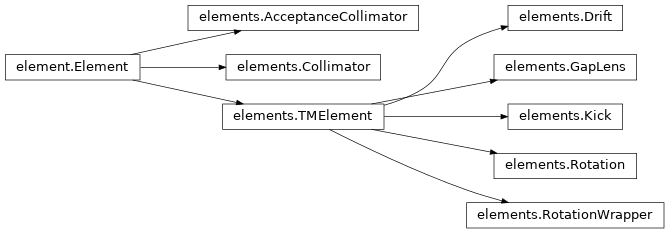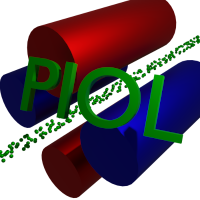piol.elements module¶
Inheritance diagram¶

API reference¶
- class piol.elements.AcceptanceCollimator(alpha_x, beta_x, epsilon_x, alpha_y, beta_y, epsilon_y, name='AcceptanceCollimator', description='')[source]¶
Bases:
piol.element.ElementCollimator for modelling a system acceptance
Collimates particles outside an elliptical (x,x’) or (y,y’) phase spaces. The acceptance is defined using epsilon value (geometrical product of half axes, area of ellipse is pi*epsilon) and Twiss parameters alpha and beta. The ellipse is defined with gamma*x^2 + 2*alpha*x*x’ + beta*x’^2 = epsilon, where beta*gamma - alpha^2 = 1. Gamma is calculated internally.
- Parameters
alpha_x (float) – Twiss parameter alpha of acceptance ellipse on (x,x’) plane
beta_x (float) – Twiss parameter beta of acceptance ellipse on (x,x’) plane
epsilon_x (float) – Geometrical emittance value of acceptance ellipse on (x,x’) plane
alpha_y (float) – Twiss parameter alpha of acceptance ellipse on (y,y’) plane
beta_y (float) – Twiss parameter beta of acceptance ellipse on (y,y’) plane
epsilon_y (float) – Geometrical emittance value of acceptance ellipse on (y,y’) plane
- plot(view, s)[source]¶
Plot the element
Plots a representation of the element using the plotter interface in a cross section view. Defaults to plotting nothing.
- Parameters
ax (Axis) – Axis instance to plot on
view (str) – String describing which viewpoint to draw on. Must be known to the Plotter.
s (float) – Starting distance along the optical axis for element start.
- class piol.elements.Collimator(size, name='Collimator', description='')[source]¶
Bases:
piol.element.ElementCollimator element
Can be used to make two kinds of collimator. Ones with round apertures (size is a single number, the radius) or rectangular collimators (size is tuple with half-sizes in x and y). Cuts the beam in the physical dimensions.
- Parameters
size (float or tuple) – Size of collimator
- height(dimension=None)[source]¶
Calculate the height of the element.
- Returns
float
- Return type
Height of the element.
- plot(ax, view, s)[source]¶
Plot the element
Plots a representation of the element using the plotter interface in a cross section view. Defaults to plotting nothing.
- Parameters
ax (Axis) – Axis instance to plot on
view (str) – String describing which viewpoint to draw on. Must be known to the Plotter.
s (float) – Starting distance along the optical axis for element start.
- class piol.elements.Drift(dl, name='Drift length', description='', collimator=None, thickness=None)[source]¶
Bases:
piol.elements.TMElementDrift element
Transports the beam through a length without electromagnetic interactions.
- Parameters
dl (float) – Drift length of the element in m.
- length()[source]¶
Calculate the length of the element.
- Returns
float
- Return type
Length of the element.
- plot(ax, view, s)[source]¶
Plot the element
Plots a representation of the element using the plotter interface in a cross section view. Defaults to plotting nothing.
- Parameters
ax (Axis) – Axis instance to plot on
view (str) – String describing which viewpoint to draw on. Must be known to the Plotter.
s (float) – Starting distance along the optical axis for element start.
- class piol.elements.GapLens(Leff, N, D, name='Gap lens', description='')[source]¶
Bases:
piol.elements.TMElementGap lens element
Implements the first order approximation of a nonrelativistic cylindrical gap lens, also known as the immersion lens. The gap lens accelerates the beam from kinetic energy T1 to kinetic energy T2 in gap with effective length Leff.
Typically effective length is approximated as Leff = L + D, where L is the physical gap length and D is the lens tube diameter.
Reference F. Hinterberger, “Ion optics with electrostatic lenses”, in Proc. of the Specialised CAS Course on Small Accelerators, Zeegse, The Netherlands, 24 May - 2 Jun 2005, pp. 27-44 (CERN-2006-012).
- Parameters
Leff (float) – Effective gap length
N (float) – Relative energy change T2/T1
D (float) – Diameter of aperture
- length()[source]¶
Calculate the length of the element.
- Returns
float
- Return type
Length of the element.
- plot(ax, view, s)[source]¶
Plot the element
Plots a representation of the element using the plotter interface in a cross section view. Defaults to plotting nothing.
- Parameters
ax (Axis) – Axis instance to plot on
view (str) – String describing which viewpoint to draw on. Must be known to the Plotter.
s (float) – Starting distance along the optical axis for element start.
- class piol.elements.Kick(coord, value, height=1, name='Kick', description='')[source]¶
Bases:
piol.elements.TMElementA thin kick element
Adds a constant to a single property of particles. Can be used to model, for example, the effect of alignment errors.
- Parameters
coord (str) – What particle property is modified.
value (float) – What value of addition is made.
height (float) – Height of elements used in plotting.
- length()[source]¶
Calculate the length of the element.
- Returns
float
- Return type
Length of the element.
- plot(ax, view, s)[source]¶
Plot the element
Plots a representation of the element using the plotter interface in a cross section view. Defaults to plotting nothing.
- Parameters
ax (Axis) – Axis instance to plot on
view (str) – String describing which viewpoint to draw on. Must be known to the Plotter.
s (float) – Starting distance along the optical axis for element start.
- class piol.elements.Rotation(angle, name='Rotation', description='')[source]¶
Bases:
piol.elements.TMElementRotation element
An element that rotates the beam by a given angle around the optical axis.
- Parameters
angle (float) – Angle for the rotation in degrees in counter clockwise direction.
- class piol.elements.RotationWrapper(angle, subelement, name='RotationWrapper', description='')[source]¶
Bases:
piol.elements.TMElementWrapper for an element to rotate it.
- Parameters
angle (float) – Angle for the rotation in degrees in counter clockwise direction.
subelement (obj:Element) – Element to rotate
name (str) – Name given to the element
description (str) – Description of the element, currently not used.
- field(kind)[source]¶
Return the field strength within the element.
- Parameters
kind ({'magnetic' , 'electric'}) – String to select field type.
- Returns
Field strength within the element.
- Return type
float
- length()[source]¶
Calculate the length of the element.
- Returns
float
- Return type
Length of the element.
- plot(ax, view, s)[source]¶
Plot the element
Plots a representation of the element using the plotter interface in a cross section view. Defaults to plotting nothing.
- Parameters
ax (Axis) – Axis instance to plot on
view (str) – String describing which viewpoint to draw on. Must be known to the Plotter.
s (float) – Starting distance along the optical axis for element start.
- processTrajectory(driver, plesToSave, ds, dr, dx, dy)[source]¶
Process the particles and profile plane information before saving those.
This is called by driver. This method is implemented only in elements which are wrapping other elements and are for example rotating the elements it is containing. By default this method just returns all the arguments in the same order.
- class piol.elements.TMElement(refple=None, name='', description='')[source]¶
Bases:
piol.element.ElementBase class for all elements using transfer matrix formalism.
- Parameters
refple (ReferenceParticle) – Reference particle for which the element is to be designed.
name (str) – Name given to the element.
description (str) – Description of the element, currently not used.
